
The business landscape has undergone a seismic shift in recent years, transforming AI literacy from a specialist skill to a fundamental business competency. This transformation is evidenced by striking data: 74% of employers now actively seek AI and machine learning proficiency in MBA graduates, with AI skills surging from 21st to 4th place in desired competencies for new hires.
This dramatic elevation of AI literacy isn’t merely a temporary trend. This comprehensive approach reflects a fundamental reality: AI has become as essential to business operations as financial literacy or strategic thinking.

Academic Validation
The permanence of this shift is further validated by academic leaders.
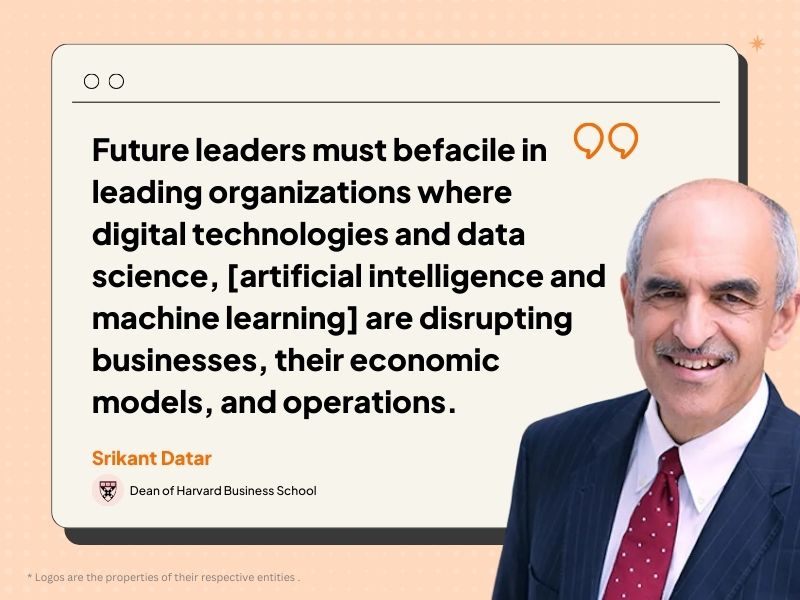
This perspective is echoed across top business schools, with 70% of deans and faculty acknowledging that generative AI is “rapidly, and likely irrevocably, transforming productivity.”
The implications for MBA graduates are clear and consequential:
- Those without AI literacy face significant career limitations
- Consulting and finance firms increasingly require AI-proficient professionals
- McKinsey and other leading consultancies now routinely engage in AI-driven projects
- AI literacy has become a prerequisite for career advancement
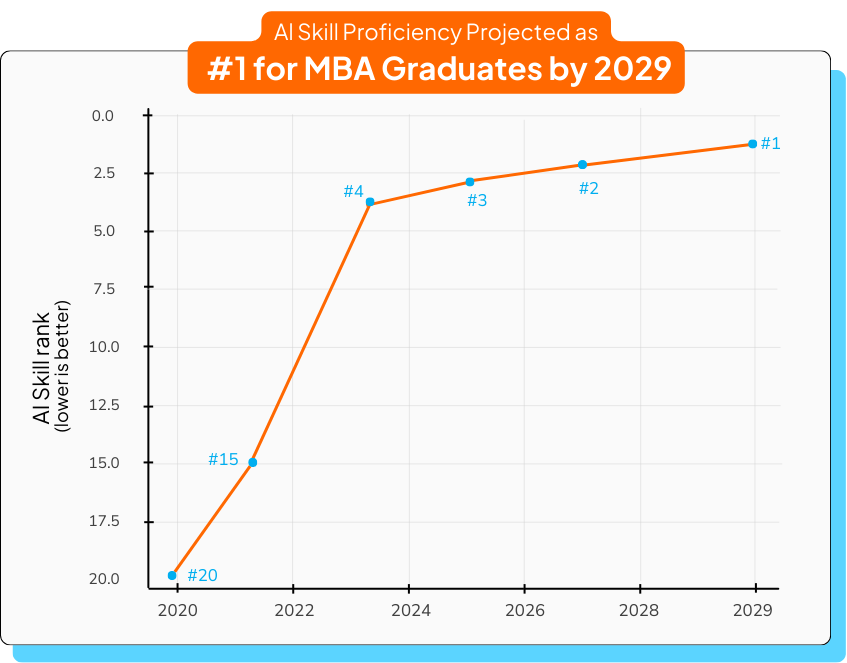
Looking forward, the trajectory is unmistakable. Western European employers predict AI skill proficiency will become the #1 most important skill for MBA graduates by 2029. This projection underscores a crucial reality: AI literacy isn’t just about technical proficiency – it’s about maintaining relevance in an AI-driven business world.
Overwhelming Market Demand: What Employers Are Saying
The market’s verdict is unequivocal: AI proficiency has become a critical differentiator for MBA graduates. A compelling 74% of employers now explicitly seek artificial intelligence and machine learning skills in their MBA hires, according to GMAC’s latest Corporate Recruiters Survey. This represents a remarkable shift – AI skills have vaulted from 21st place in employer priorities just a few years ago to become the fourth most desired competency today.
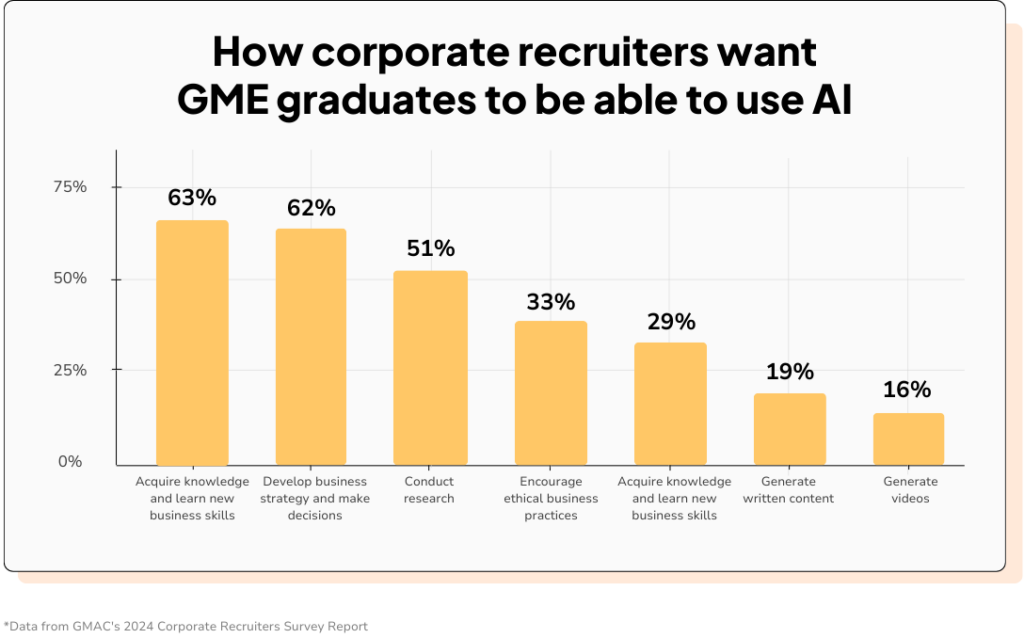
This transformation is evident across industries:
- In the technology sector, companies are aggressively prioritizing AI capabilities. Clara Shih, CEO of Salesforce’s AI division, exemplifies this shift: “We’re retraining every single person in recruiting, sales, finance, and customer support and evangelizing for them to become AI experts.” This comprehensive mandate signals that AI proficiency isn’t just for technical roles – it’s becoming essential across all business functions.
- Traditional MBA employers are similarly evolving their requirements. Management consulting firms, long focused on strategic thinking and client relationships, now routinely handle AI-driven projects. McKinsey and its peers increasingly seek MBAs who can bridge the gap between technical teams and business strategy, making AI literacy a crucial skill for consultants.
- Even in finance, where relationship management once dominated, employers now demand professionals who can leverage AI for analysis and decision-making.
Post-ChatGPT Impact
The acceleration of these demands is particularly striking in the post-ChatGPT era. Since late 2022, employer expectations have shifted dramatically. Looking ahead, the trajectory is clear: Western European employers predict AI skill proficiency will become their #1 most important criterion for MBA graduates by 2029.
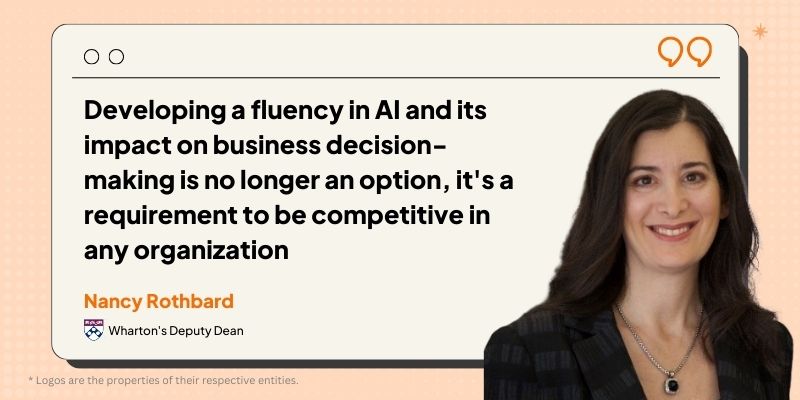
This shift isn’t merely about technical proficiency. Employers consistently emphasize that they seek MBAs who can “know their way around AI” as part of a broader growth mindset. The ability to understand and adapt to evolving AI technologies is increasingly viewed as indicative of a candidate’s potential for leadership and innovation in a rapidly changing business environment.
Top Business Schools’ Response: Curriculum Revolution

The world’s leading business schools are undertaking their most significant curriculum overhaul in decades, reimagining MBA education for the AI era. This transformation isn’t merely incremental – it represents a fundamental shift in how future business leaders are trained.
MIT Sloan’s Pioneering Approach
MIT Sloan exemplifies this revolution, launching multiple AI-focused courses in 2023-24, including the foundational “AI Foundations for MBAs.” This course explicitly aims to “level the playing field” by ensuring all students, regardless of technical background, gain practical experience with generative AI tools.
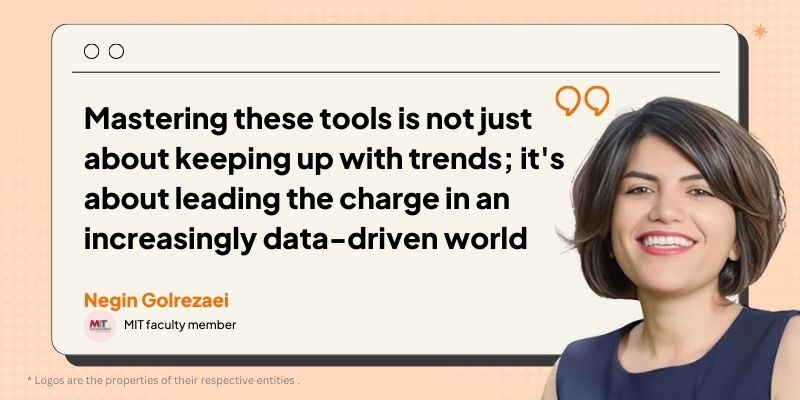
Mastering these tools is not just about keeping up with trends; it’s about leading the charge in an increasingly data-driven world.
MIT faculty member Negin Golrezaei explains
Wharton’s Comprehensive Strategy
Wharton has gone even further, providing all MBA students with ChatGPT Enterprise licenses and launching a comprehensive AI & Analytics Initiative in 2024. This initiative includes substantial funding for faculty to incorporate AI into existing coursework and supports research on AI’s business applications. Under Dean Erika James’s leadership, Wharton is “investing heavily” to prepare students for the complex challenges AI presents across industries.
Stanford GSB
Stanford Graduate School of Business has similarly integrated AI throughout its curriculum, with Dean Jonathan Levin spearheading efforts to incorporate large language models into core courses.
INSEAD
INSEAD has introduced specialized programs like “AI for Business” alongside strategic AI electives, demonstrating that this revolution spans continents.
Market-Driven Transformation
These changes directly respond to the market demands outlined earlier.
- When 74% of employers seek AI-proficient MBAs, schools must deliver or risk becoming irrelevant.
- The pace of change is particularly striking: while AI barely featured in MBA curricula five years ago, it’s now woven into every aspect of business education at top institutions.
The transformation extends beyond adding AI-specific courses. Schools are fundamentally rethinking how traditional subjects like finance, marketing, and operations are taught in an AI-enabled world. Harvard Business School’s Dean Srikant Datar emphasizes that future leaders must understand how AI disrupts “businesses, their economic models, and operations” – not just in theory, but in practice.
This institutional response validates what industry leaders have been saying: AI literacy is no longer optional for business leaders. When elite institutions commit resources at this scale, it sends a clear message about the future of business education and leadership.
Career Impact: The AI Skills Premium
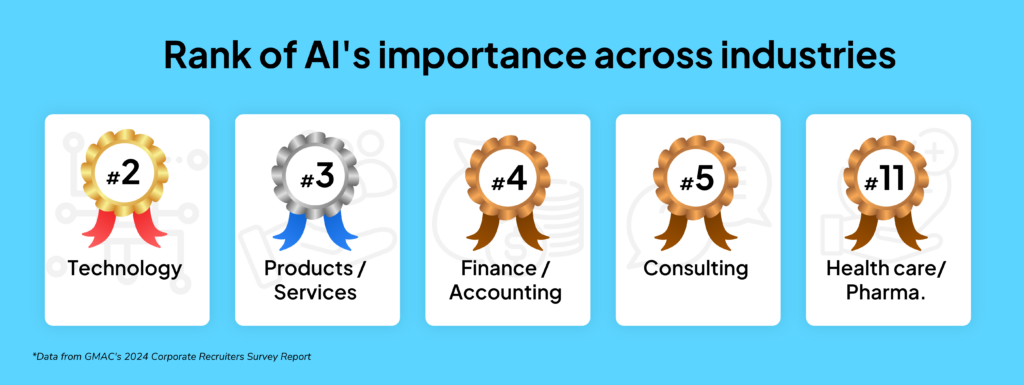
The career advantages of AI literacy for MBA graduates are becoming increasingly concrete and quantifiable. Recent data reveals that MBAs with strong AI capabilities command significant salary premiums – often 20-30% higher than their peers without such skills.This differential is particularly pronounced in sectors undergoing rapid AI transformation, such as financial services, consulting, and technology.
The impact extends far beyond traditional tech roles.
- In marketing, AI-savvy MBAs are leveraging machine learning for customer segmentation and predictive analytics, commanding higher positions and faster career advancement.
- Financial analysts who can harness AI for risk assessment and portfolio management are increasingly preferred for senior roles.
- Operations managers fluent in AI-driven process optimization are seeing accelerated paths to executive positions.
Consider the consulting sector: McKinsey now requires all consultants, regardless of specialization, to demonstrate AI literacy. This sentiment echoes across industries – from Goldman Sachs’s emphasis on AI-driven financial modeling to Procter & Gamble’s focus on AI-powered market analysis.
We’re not looking for data scientists, but for business leaders who can translate AI capabilities into strategic advantage.
– A McKinsey hiring partner
The career premium of AI skills is particularly evident in role evolution. Traditional MBA positions are being redefined: marketing managers are becoming marketing analytics leaders, financial analysts are transitioning to quantitative strategists, and operations managers are evolving into digital transformation directors. These evolved roles typically offer 25-40% higher compensation packages.

Looking ahead, the career advantage of AI literacy will likely intensify. As Salesforce’s CEO Marc Benioff predicted, “Every major business decision will involve AI within five years.” This transformation means that MBAs who can effectively leverage AI tools and understand their strategic implications will increasingly occupy the most influential – and lucrative – positions in their organizations.
For ambitious MBAs, the message is clear: AI literacy isn’t just about staying competitive – it’s about positioning oneself for leadership in an AI-driven business landscape. As one Harvard Business School career advisor noted, “The question isn’t whether AI skills will matter, but how much of a career disadvantage you’ll face without them.”
Are you planning to pursue MBA at top business schools? Let us help you conquer the first step of the process i.e., taking the GMAT. Take a free mock test to understand your baseline score and start your GMAT prep with our free trial. We are the most reviewed online GMAT Prep company with 2800+ reviews on GMATClub.
The Post-ChatGPT Era: No Looking Back
November 2022 marked a point of no return in business leadership with ChatGPT’s debut. This breakthrough in generative AI didn’t just introduce a new technology – it fundamentally altered expectations for business leaders across every industry. The impact was immediate and profound: within months, what was once considered advanced AI knowledge became a baseline requirement for business professionals.
The numbers tell a compelling story of transformation –
Prior to ChatGPT, AI skills ranked 21st out of 22 in employer priority lists for MBA graduates. By early 2024, they had
- catapulted to the fourth most desired competency,
- with 74% of employers now explicitly seeking AI and machine learning proficiency in their MBA hires.
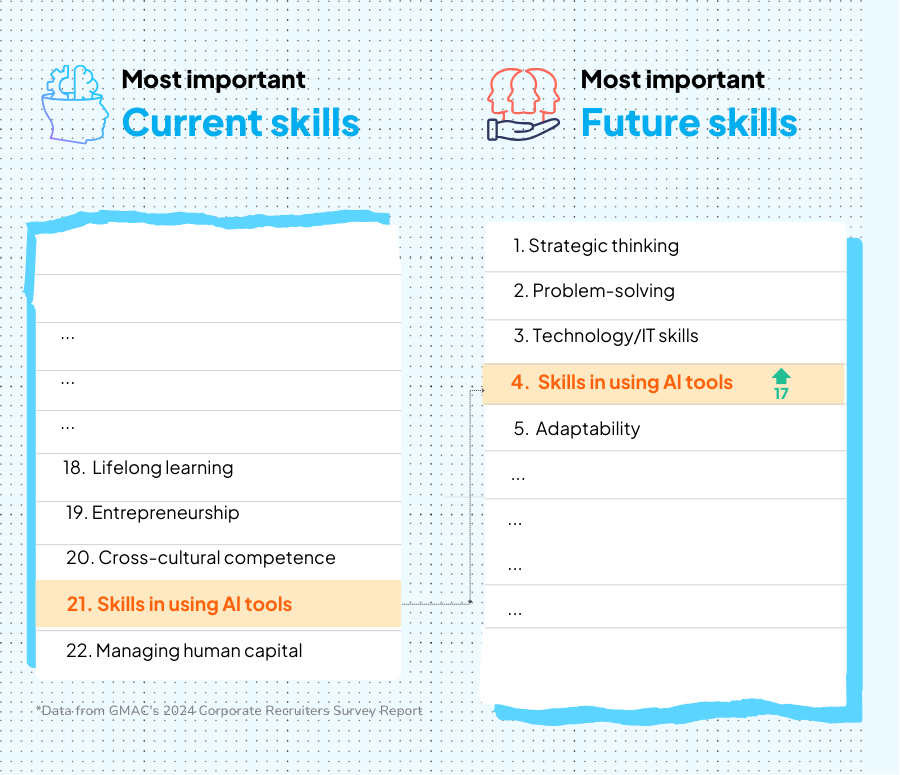
This dramatic shift reflects a new reality: understanding AI is no longer optional for business leaders.
The pace of adoption has been unprecedented. While AI’s importance had been growing gradually since 2018, ChatGPT’s arrival triggered an avalanche of change. As Clara Shih, CEO of Salesforce’s AI division, emphasizes: “We’re retraining every single person in recruiting, sales, finance, and customer support and evangelizing for them to become AI experts.” This mandate extends far beyond tech companies – traditional industries from manufacturing to healthcare are rapidly following suit.
What makes this moment particularly significant is its permanence. Unlike previous technological shifts that affected specific sectors or functions, AI’s impact is universal and irreversible. As Wharton’s Deputy Dean Nancy Rothbard states, “Developing a fluency in AI and its impact on business decision-making is no longer an option, it’s a requirement to be competitive in any organization.”
The post-ChatGPT era has established a new baseline for business literacy. Just as digital literacy became non-negotiable in the 1990s, AI literacy is now fundamental to business leadership. This shift is reflected in projected trends: Western European employers predict AI skill proficiency will become the #1 most important skill for MBA graduates by 2029, a remarkable projection that underscores the permanence of this change.
For MBA students and professionals, this new era demands immediate action. The rapid integration of AI into business school curricula, as detailed earlier, directly responds to this shifting landscape. The career advantages and salary premiums now associated with AI literacy aren’t temporary trends – they’re early indicators of a permanent restructuring of business leadership requirements.
Critical Insights:
- AI literacy becoming fundamental to business leadership
- Parallel to digital literacy evolution in the 1990s
- Projected #1 skill requirement by 2029
Future-Proofing Your MBA Investment
The evidence is unequivocal: AI literacy has become the defining factor in maximizing returns on an MBA education. As we look toward 2029, when AI proficiency is projected to become the most crucial skill for MBA graduates, the question isn’t whether to embrace AI learning, but how quickly and thoroughly to do so.
ROI Implications
The ROI implications are stark. With AI-savvy MBAs commanding 20-30% higher salaries and accelerated career trajectories, the financial impact of AI literacy will likely compound over time. As traditional MBA roles evolve into AI-enhanced positions – from marketing managers to marketing analytics leaders, from financial analysts to quantitative strategists – the gap between AI-literate and AI-hesitant professionals will only widen.
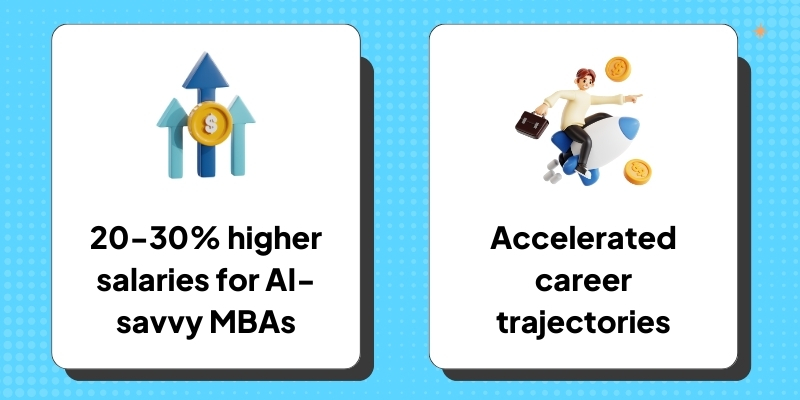
For current and prospective MBA students, this presents both a challenge and an opportunity. The challenge lies in developing meaningful AI competency alongside traditional business skills.
Strategic Action Plan
The opportunity lies in positioning oneself at the forefront of business transformation. Here’s what this means in practical terms:
- First, seek out AI-focused coursework beyond basic requirements. As top schools from Harvard to Wharton reshape their curricula, take advantage of every opportunity to develop AI skills. This includes both technical courses and strategic management classes that incorporate AI applications.
- Second, pursue hands-on experience with AI tools. Whether through internships, capstone projects, or independent initiatives, practical experience with AI implementation is invaluable. The goal isn’t to become a data scientist, but to develop the fluency needed to lead AI-driven initiatives.
- Third, cultivate an AI-oriented mindset. Understanding AI isn’t just about technical skills – it’s about developing the ability to identify AI opportunities, manage AI-human collaboration, and navigate ethical considerations. This strategic perspective will become increasingly valuable as AI penetrates every aspect of business decision-making.
Looking ahead, the trajectory is clear. By 2029, AI literacy won’t just be an advantage – it will be a prerequisite for business leadership. As Clara Shih of Salesforce emphasizes, entire organizations are being reoriented around AI expertise. MBA graduates who invest in AI skills now will be uniquely positioned to lead this transformation.
AI literacy won’t just be an advantage – it will be a prerequisite for business leadership.
The stakes are high. As traditional MBA roles evolve and new AI-enabled positions emerge, those who fail to develop AI literacy risk being left behind. The salary premiums and career advantages currently associated with AI skills are likely early indicators of a much larger shift in how business value is created and captured.
Final Thoughts
For ambitious MBAs, the message is clear: investing in AI literacy isn’t just about staying competitive – it’s about securing a place at the forefront of business innovation. As we move toward an AI-driven future, the most valuable business leaders will be those who can bridge the gap between human insight and artificial intelligence, creating new value at the intersection of traditional business acumen and technological innovation.














